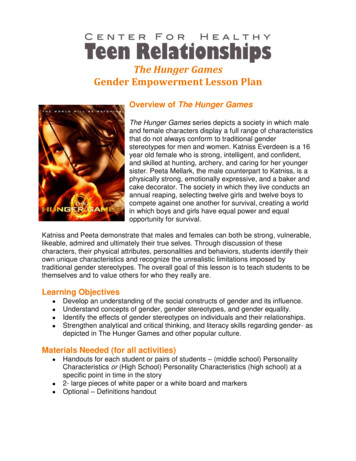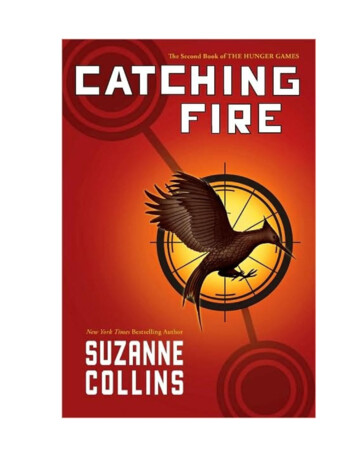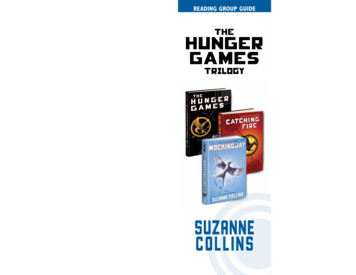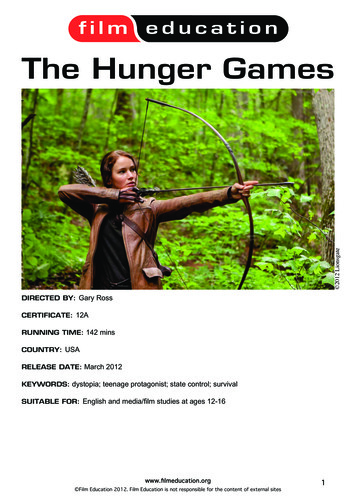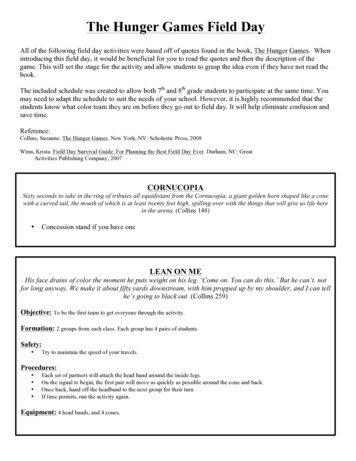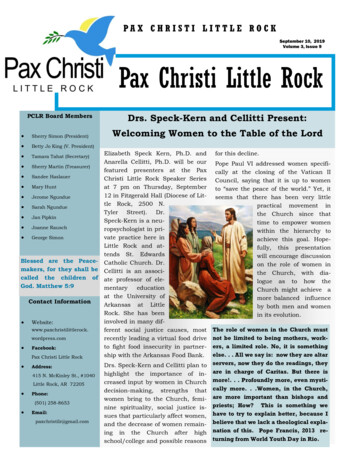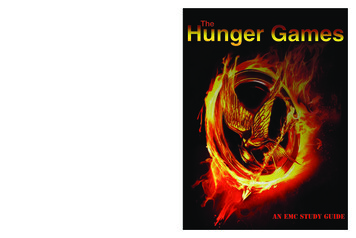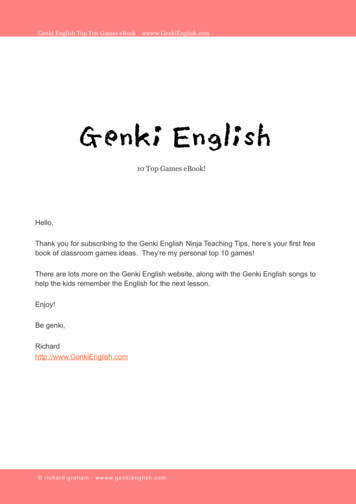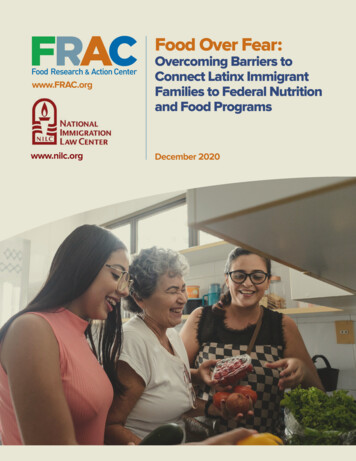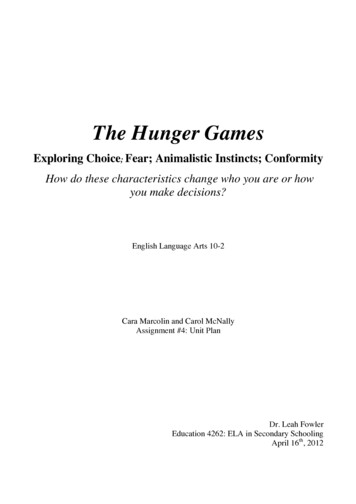
Transcription
The Hunger GamesExploring Choice; Fear; Animalistic Instincts; ConformityHow do these characteristics change who you are or howyou make decisions?English Language Arts 10-2Cara Marcolin and Carol McNallyAssignment #4: Unit PlanDr. Leah FowlerEducation 4262: ELA in Secondary SchoolingApril 16th, 2012
Marcolin & McNallyUniversity of LethbridgeSpring 2012The Hunger GamesExploring Choice; Fear; Animalistic Instincts; ConformityHow do these characteristics change who you are or how you makedecisions?Table of Contents1. Unit Overview2. Rationale3. Connections to the English Language Arts Strands4. Statement of Program of Studies General and Specific Outcomes5. Statement of Intended Unit Learning Outcomes6. Essential Unit Questions7. Texts and Materials8. Organization and Structure9. Modifications for Enrichment/Special Considerations10.Connections to Other Areas of Curriculum11.Assessment12.Accompanying Display13. Unit Defence/ReflectionAppendices:I. Unit Assessment PlanII. Novel Resources/TextsPage 2 of 23
Marcolin & McNallyUniversity of LethbridgeSpring 2012The Hunger GamesTopic: Novel StudyGrade: ELA 10-2Timeline: 25 Lessons – 62min. /87 min. classes (approx. 5weeks)1. Overview: The Hunger Games is a thematic unit designed to teach grade 10-2 English Language Artsnovel, through the discovery and creation of different narrative formats. Daily Instruction – The lesson will begin with reading the selected chapter(s), this will be donein numerous ways: teacher read, individual student –“popcorn reading,” listening to the novelCDs, small group etc. Throughout the particular reading format, the teacher will stop atimportant intervals and discuss key passages, elements, or structure. The new information thatwill be discussed in this unit will be the specific novel structure, theme, style, and meaning,along with an overview of post-apocalyptic and dystopian societies. This way the discussionwill be more extensive and in-depth, as well as serving as review from the previous short storyand poetry unit, and a pre-curser to the next Shakespeare unit. Practice and Application – After reading and determining the key concepts of the dailychapter(s) selection, students will work in pairs, small groups, and sharing circles to discuss thecharacterization, plot, theme, literary devices, and overall understanding of the novel thus far.Following this discussion period, students can work on their Facebook pages, which will serveas formative assessment for the final essay and the major creative assignment. Facebook Assignment – Throughout the course of the unit, students will have time weekly(sometimes daily- based on the instruction material) to work on their Facebook page. For thisassignment, students will be divided into groups of two, given a character to create a Facebookaccount for, where they will blog, post, and status update, based on plot information andcharacterization for that character. This assignment is a formative assessment piece that will bechecked throughout the unit, and handed in at the completion of the novel. At the end of theunit, students should have approx. 15 status updates, based on chapter plot information, whichwill be read in class, along with approx. 7 blog posts, based on three chapters worth of plotinformation. Texts – A variety of different texts will be used in class including: short story, poetry, songsetc., which will be presented primarily through teacher/student shared reading, pair andindividual reading, as well as small discussion groups. All materials and texts were chosen withthe students’ interests, age level, and capability in mind, as well as how the texts correspondedto the instruction material. A full list of texts that will be used throughout this unit can be foundin the Novel Resource Appendix section of the unit plan. Assessment and Evaluation – For this unit, students will be assessed and evaluated in manydifferent ways. Daily assessment will include teacher observation, individual participation inclass activities, including discussion, and effort. Formative/Summative assessments will includea final critical analytical essay, two mid-point quizzes, and a written letter, which will all beteacher assessed, along with a Facebook assignment, and a creative choice project, which willbe an amalgamated grade of teacher assessment and student self-assessment.Page 3 of 23
Marcolin & McNally University of LethbridgeSpring 2012Presentation – Students will be given a “Unit Outline” at the beginning of the unit, outliningunit overview, objectives, projects and assessments. With this, students will be aware ofdeadlines, assignments, and expectations, to help encourage student-responsible learning.2. Rationale: Program of Studies - The Hunger Games satisfies many of the requirements of the AlbertaCurriculum through general and specific learner objectives. Connections – This unit is following a lengthy short study and poetry unit. Once the novelstudy unit is complete the next unit will be Shakespeare (possibly Julius Caesar). The novelstudy unit encompasses some terminology that was discussed in previous units, as well as lays afoundation for concepts that will be discussed in the following Shakespeare and film studyunits. Content and Activities – The specific activities and texts chosen for this unit are age/gradeappropriate, while presenting many different forms narratives to the students. All materials areto be used in conjunction with The Hunger Games text, and serve as supplementary knowledgeto help promote critical thinking.3. English Language Arts Strands: This unit incorporates all six of the English Language Arts Strands, through everydayinstruction, application, and assessment. Listening is used daily through direct instruction, whether it is through daily instruction on keyelements or listening to the novel being read. As well, speaking is a daily strand -there will beclass discussion on the selected chapter(s); the creative assignment presentation alsospecifically focuses on this strand. Reading and writing are also encompassed in everyday instruction. The students will read aminimum of one (1) chapter/day or read supplementary texts (short stories/poems etc.). Writingis enveloped through the Facebook assignment, in the status updates and blogging, which isfurther enhanced through quizzes, letter and essay writing, along with the creative assignment. Viewing and representing will develop throughout the unit with integration of YouTube clips ofanalogous material, as well as through different narrative mediums including songs. Thesestrands will be further enhanced through the creative project assignment, where students willpresent their projects, through a form of oral presentation.ELA Strand Graphic Organizer:ReadingWritingReading of the noveland short sayCreative ProjectsQuizzesCreative ProjectsDaily InstructionQuizzesLetterListeningSpeakingReading of thenovel and shortstoriesReading of thenovel and shortstoriesClass discussion/sharing circlesCreative ProjectPresentationsVideos / MusicClass discussion /sharing circlesCreative ProjectPresentationsLetterPage 4 of 23ViewingCreative ProjectPresentationsRepresentingCreative ProjectVideos / MusicFacebookAssignmentDaily InstructionEssay
Marcolin & McNallyUniversity of LethbridgeSpring 20124. General and Specific Learner Objectives:Students will listen, speak, read, write, view and represent to:1. Explore thoughts, ideas, feelings and experiences1.1 Discover Possibilities1.2 Extend Awareness2. Comprehend literature and other texts in oral, print, visual and multimedia forms and respondpersonally, critically, and creatively2.1 Construct meaning from text and context2.2 Understand and appreciate textual forms, elements, and techniques2.3 Respond to a variety of print and non-print texts3. Manage ideas and information3.1 Focus on purpose and presentation form3.2 Follow a plan of inquiry4. Create oral, print, visual, and multimedia texts, and enhance the clarity and artistry ofcommunication4.1 Develop and present a variety of print and non-print texts4.2 Improve thoughtfulness, effectiveness and correctness of communication5. Respect, support and collaborate with others5.1 Respect Others and Strengthen Community5.2 Work within a group5. Intended Unit Learning Outcomes:Students will be able to:1. Correctly identify the specific devices and techniques employed by Collins to develop a theme.2. Use additional literature for background comprehension to read and understand the novel.3. Correctly identify different structures and elements of novels used in The Hunger Games.4. Experiment with language and apply the writing process to develop a critical analytical essay.5. Accurately use comprehension strategies and textual cues to analyze a novel.6. Identify character traits, plot elements, and thematic devices through creative assignments.7. Speak more effectively through classroom readings, while further developing listening,viewing, and representing skills.6. Essential Questions:The essential questions students should think about throughout this unit are:Choice; Fear; Animalistic Instincts; ConformityHow do these characteristics affect or change who you are, or how you make decisions?7. Texts and Materials: Technology – Smartboard, whiteboard, PowerPoint, computers, projection and AV equipment. Daily Materials – The Hunger Games novel. Supplementary texts will be provided whennecessary. A full list of resources can be found in the Novel Resource Appendix.Page 5 of 23
Marcolin & McNallyUniversity of LethbridgeSpring 20128. Organization and Structure:Unit CalendarOctober 2012Monday1Title:Welcome to the HungerGames. getting startedObjective:Introduce the novel to thestudents (including authorbackground); get THGnovels; introduce theFacebook assignment –get partners for thisassignment; introduce unittheme (so students knowwhat to look for while weread the novel); read Ch1; begin Facebook pagecreationReadings:Facebook assignmentoutline; Ch 1Concepts:“Exploring Fear; Choice;Animalistic Instincts;Conformity – How dothese characteristicschange who you are orhow you makedecisions?” by looking atplot, structure, characters,etc.Activities:Discuss the FacebookAssignment (make sure itis clear); break thestudents into their Districtgroups – this will be doneby a random draw, justlike in the novel; read Ch1 orally and discuss theevents; Give the studentstime to begin theirFacebook page creationTuesday2Title:The ReapingObjective:Bring up any burningquestions/concernsfrom the previousclass; read “TheLottery” and Ch 2;compare and contrastthe two as a T-P-S;finish Facebook page;first status updateReadings:Ch 2 and “TheLottery” – ShirleyJacksonConcepts:Compare and contrasttwo different, yetsimilar, pieces ofliteratureActivities:Read aloud and discussthe short story and Ch2 – compare andcontrast; ask if theyfound the short storyhelpful; finish upFacebook pagecreation; Facebookstatus update #1Wednesday3Title:Journey to a NewLandObjective:Finish up anydiscussion from lastclass; read Ch 3 and4 and discuss wherenecessary; introduceblog part of theFacebook assignment– first blog postReadings: Ch 3 and4Concepts:“Exploring Fear;Choice; AnimalisticInstincts; Conformity– How do thesecharacteristicschange who you areor how you makedecisions?” bylooking at plot,structure, characters,etc.Activities:Read (class choiceon how) the twochapters and discuss,focusing on thethematic question;Blog post #1 (end ofclass – timeprovided)Page 6 of 23Thursday4Title:The BeautificationProcessObjective:Finish up anythingfrom the previousday; read Ch 5 – 6and discussimportant passages,plot lines, etc. alongthe way; classactivityReadings: Ch 5 – 6Concepts:How does theCapitol representsociety? and“Exploring Fear;Choice; AnimalisticInstincts; Conformity– How do thesecharacteristicschange who you areor how you makedecisions?” bylooking at plot,structure, characters,etc.Activities:Read and discuss thetwo chapters; classactivity – what areyou go at? (discussyour skills and howthey would benefityou in the games andhow you wouldimpress theintoxicated judges);Facebook statusupdate #2Friday5Title:Training and TributesObjective:Finish up anythingfrom last class; readCh 7 and discuss as aclass; second blog postReadings: Ch 7Concepts:“Exploring Fear;Choice; AnimalisticInstincts; Conformity– How do thesecharacteristics changewho you are or howyou make decisions?”by looking at plot,structure, characters,etc.; who would beyour competition andwhy?Activities:Read the chapter (tryto get on tape) anddiscuss as a class;Blog Post #2 (end ofclass – time provided)
Marcolin & McNally8ThanksgivingNo ClassesUniversity of Lethbridge9Title:Flashbacks and FastforwardsObjective:Ask the students abouttheir Thanksgivingweekends; ask ifanyone has anyburningquestions/concernsfrom previous classes;read Ch 8 – 9 anddiscuss as a class; Quiztomorrow; thirdFacebook status updateReadings: Ch 8 – 9Concepts:“Exploring Fear;Choice; AnimalisticInstincts; Conformity –How do thesecharacteristics changewho you are or howyou make decisions?”by looking at plot,structure, characters,etc.; what emotions areyou feeling towards thecharacters?Activities:Read the chapters anddiscuss the events as agroup; discuss the quiz(if you have been hereyou’ll do fine – nothere to trick you, but tosee what you know);Facebook Status #3(end of class – timeprovided)10Title:Work Hard, PlayHarderObjective:Write quiz; SurvivorActivity (how andwhat would yousurvive?); SongParody Creation –Weird Al type-thingReadings:Quiz questions;songsConcepts:Animalistic Instinctsand CreativeLiberties (Parody/Satire)Activities:Write Part I Quiz;students will thenplay a short SurvivorActivity (groups) – I.Answer thefollowing questionswith your partners:what would be yourfirst (animalistic)instinct if you werethrown into thegames, abandoned ona deserted island,etc.; how would youensure your survival?II. Bring up what thestudents have comeup with – have thestudents decidewhich group wouldsurvive the longestand the shortest andexplain why. (Notevery person is goingto agree with theirpartners, but as longas they can validatetheir point that iswhat matters); if timeallows the studentswill parody a songand make it fit forthis novel and thePage 7 of 23Spring 201211Title:Let the GamesBeginObjective:Watch The Simpsonsvideo parody/satire(good intro to thegames); read Ch 10 –11 and discuss as aclass – includediscussion about thevideo as well(compare/ contrast,why did it work/notwork?); Facebookstatus updateReadings: Ch 10 11Concepts:Parody/ Satire;“Exploring Fear;Choice; AnimalisticInstincts; Conformity– How do thesecharacteristicschange who you areor how you makedecisions?” bylooking at plot,structure, characters,etc.Activities:Watch The SimpsonsTreehouse of HorrorXVI – Survival ofthe Fattest; discusswhat the studentsthink is going tohappen at thebeginning of thegames; read Ch 10 –11 and discuss theevents as a group;Facebook Status #412Title:TraitorObjective:Go over letter writingassignment; give alittle time to work on it– Due MondayOctober 15th; read Ch12 and discuss theevents; third blogReadings:Letter Assignmenthandout; Ch 12Concepts:“Exploring Fear;Choice; AnimalisticInstincts; Conformity– How do thesecharacteristics changewho you are or howyou make decisions?”by looking at plot,structure, characters,etc. – idea of Traitor(connects to all fourthematic areas)Activities:Write a letter to theCapitol (PresidentSnow) about youropinion on the HungerGames – continue orbe abolished?; get afew minutes of classtime to jot down ideasfor the letter; read Ch12 and discuss theevents – specificallyinvolving Peeta; Blog#4 and if there is time,they can continueworking on theirletters – DUEMONDAY homework!?
Marcolin & McNally15Title:Life SaversObjective:Take in the LetterAssignments; read anddiscuss Ch 13 – 14; fifthFacebook status updateReadings: Ch 13 - 14Concepts:“Exploring Fear; Choice;Animalistic Instincts;Conformity – How dothese characteristicschange who you are orhow you makedecisions?” by looking atplot, structure, characters,etc.Activities:Take in the LetterAssignments; read anddiscuss Ch 13 – 14 as aclass; Facebook Status #5University of Lethbridge16Title:An Unlikely PairObjective:Finish up anydiscussion from theprevious class; read Ch15 – 16; fifth blogReadings: Ch 15 - 16Concepts:“Exploring Fear;Choice; AnimalisticInstincts; Conformity –How do thesecharacteristics changewho you are or howyou make decisions?”by looking at plot,structure, characters,etc. – large focus onCHOICEActivities:Read and discuss thechapters and theimportant events,characterdevelopmentsand the other thematicsections; Blog #5 (endof class – timeprovided)events that havetaken place – showsome examples thathave been created(“Sexy and I KnowIt” and “Set Fire tothe Rain”)17Title:Death: A Fair andFoul MistressObjective:Discuss any burningquestions from theprevious class; readCh 15 – 16 anddiscuss as a class;sixth Facebook statusupdateReadings: Ch 15 16Concepts:“Exploring Fear;Choice; AnimalisticInstincts; Conformity– How do thesecharacteristicschange who you areor how you makedecisions?” bylooking at plot,structure, characters,etc.; how did thesetwo chapters makeyou feel? Were youshocked by what andhow it happened?Activities:Read and discuss theevents of Ch 15 – 16;Facebook Status #6Page 8 of 23Spring 201218Sharing Circle DayBlogging*Flex day – this day(and half of the next)can be removedentirely if time isneeded to catch upon the readingsTitle:Let’s Share YourThoughtsObjective:Explain the purposeand the rules of asharing circle; have asharing circle; sixthBlogReadings: nonetodayConcepts:“Exploring Fear;Choice; AnimalisticInstincts; Conformity– How do thesecharacteristicschange who you areor how you makedecisions?” bylooking at plot,structure, characters,etc. through classdiscussionActivities:Sharing Circle - onehalf is studentquestions that theyhave and want eachother’s opinion onand the other half is ateacher directedquestion; Blog #619Title:French Fry Period –“It’s Time to‘Ketchup’”Objective:Introduce the finalcreative project; andgive work time – thisis a time for to catchup on their blogs orother unfinished work(for this class) or workon their final project –ask questions, pickgroup, plan ideas, etc.Readings:Final Project outlineConcepts:Finish or Beginprojects orassignmentsActivities: Introducethe Final Project and awork period – studentschoose what they needto get done
Marcolin & McNally22Title:Star-crossed LoversObjective:Any questions aboutanything (previouschapters or assignments)?;read and discuss theevents of Ch 19 – 20;seventh Facebook statusupdateReadings: Ch 19 - 20Concepts:“Exploring Fear; Choice;Animalistic Instincts;Conformity – How dothese characteristicschange who you are orhow you makedecisions?” by looking atplot, structure, characters,etc. – do you thinkKatniss’ feelings aregenuine or she isencompassing thefollowing thematicprinciples to better serveherself?Activities:Read and discuss theevents of Ch 19 - 20 –especially in terms ofKatniss; Facebook Status#729Title:Essay Prep DayObjective:Educate the students onhow to properly write aCritical Analytical Essay– the do’s and don’ts,format, purpose; andprepare for the in-classessay the next dayReadings:Critical Analytical EssayOutlineActivities: Learn aboutCritical Analytical Essayand prepare ideas for thein-class essay the next dayUniversity of LethbridgeSpring 201223Title:Cornucopia Feast ofChampions?Objective:Check to see if thereare any burningquestions/ concernsabout the previousclass; read Ch 21 – 22and discuss the eventsthat took place;seventh BlogReadings: Ch 21 - 22Concepts:“Exploring Fear;Choice; AnimalisticInstincts; Conformity –How do thesecharacteristics changewho you are or howyou make decisions?”by looking at plot,structure, characters,etc. – especially theAnimal InstinctsaspectsActivities:Read and discuss Ch21 – 22 – especially interms of AnimalisticInstincts; Blog #724Title:And then there wereThreeObjective:Finish up anydiscussions from lastclass; read anddiscuss the eventsthat happened in Ch23 – 24; eighthFacebook statusupdateReadings: Ch 23 24Concepts:“Exploring Fear;Choice; AnimalisticInstincts; Conformity– How do thesecharacteristicschange who you areor how you makedecisions?” bylooking at plot,structure, characters,etc.Activities:Read and discuss Ch23 – 24; FacebookStatus #825Title:To the Victor goesthe SpoilsObjective:Finish up anydiscussion from theprevious classdiscussions; read anddiscuss Ch 25 – 26;ninth Facebookstatus updateReadings: Ch 25 26Concepts:“Exploring Fear;Choice; AnimalisticInstincts; Conformity– How do thesecharacteristicschange who you areor how you makedecisions?” bylooking at plot,structure, characters,etc. – especially interms of the fourthematic principlesActivities:Read and discuss theevents of Ch 25 – 26;Facebook Status #926Title:A Not So HappyEndingObjective:Read and discuss thefinal chapter (27) ofthe book and the bookas a whole; final BlogReadings: Ch 27Concepts:“Exploring Fear;Choice; AnimalisticInstincts; Conformity– How do thesecharacteristics changewho you are or howyou make decisions?”by looking at plot,structure, characters,etc.Activities:Read and discuss theentire book and focuson the thematicprinciples, we chose tofocus on, as a whole –what did you think ofthe book? Is thereanything that youwould have changed?Added? Removed?;Blog #83031November 1November 2Putting it allTogetherPutting it allTogetherHunger GamesMovieHunger Games MovieIn-Class CriticalAnalytical EssayCreative ProjectsDuePresentation DayPage 9 of 23
Marcolin & McNallyUniversity of LethbridgeSpring 20129. Modifications for Enrichment/Special Considerations:The Hunger Games can be modified and incorporate special conditions if the occasion were toarise. Readings – The supplementary material texts are designed to be read in class to help guide andimplement instruction of a specific concept. If need be, the texts can be assigned a day or two inadvance, to be read at home to allow for optimal understanding of the upcoming concepts. Assignments – The assignments for the unit are fairly straight forward and are designed to becriterion based and allow for a magnitude of student choice. If the assignment poses to large orlittle of a challenge for a particular student, then negotiations can be done to change theoutcome of the assignment to better suit the needs of the individual student. Timeline – The timeline of the unit, specifically regarding the assignments, can be negotiated ifneed be. The students are given class time to work on their Face Book assignment as well astheir creative assignments, letter assignment, and critical analytical essay, but there is some flexin the schedule to allow for extensions on assignments. Individualized Personal Program – The unit has several areas that can be flexible to fit theaccommodations of students who require IPP’s, including extra time on assignments and exams,class notes, and materials available before the scheduled class etc.10. Connections to Other Areas of Curriculum: ICT Outcomes – The Hunger Games can be connected to the ICT program of studies throughthe use of computer assistance in creating their creative projects, letter and critical analyticalessay.C.1 - Students will access, use and communicate information from a variety oftechnologies 4.4 – Communicate in a persuasive and engaging manner, through appropriateforms, such as speeches, letters, reports and multimedia presentations, applyinginformation technologies for context, audience and purpose that extend andcommunicate understanding of complex issueso P.1 – Students will compose, revise and edit text 4.1 – Continue to demonstrate the outcomes achieved in prior grades and coursesubjectso P.3 – Students will communicate through multimedia 4.1 – Select and use, independently, multimedia capabilities for presentations invarious subject areas 4.2 – Support communication with appropriate images, sounds and music 4.3 – Apply general principles of graphic layout and design to a document inprocessSocial Studies Outcomes – This unit could also be connected to the 10-2 Social Studiescurriculum through integration of key and related issues.o Should globalization shape identity?o Does globalization contribute to sustainable prosperity for all people?Fine Arts Outcomes – Through the visual representation component of the creative projectassignment, several Fine Arts Outcomes could be incorporated into the rubric as well.o Page 10 of 23
Marcolin & McNallyUniversity of LethbridgeSpring 201211. Assessment: Formative – The Hunger Games is a relatively long unit that incorporates a multitude of ideas,concepts, and narrative forms. Formative assessment will be evaluated daily in observation,class discussion/participation, and effort, along with the Face Book and letter assignments, andtwo quizzes. Summative – Summative assessment includes the critical analytical essay, and creative projectassignment, which incorporate most of the general and specific learner objectives designed forthis unit. Full outline and description of assessment tools can be found in the Unit Assessment PlanAppendix.12. Plan for Accompanying Display: The Hunger Games can be supported with an accompanying bulletin board in many differentways. The way that we thought would be the best would be an interactive board that says“Welcome to the 2012 Hunger Games” and has all of the 12 districts represented. Once studentsare divided into their districts, for their Face Book assignments, their pictures and status postswill be displayed on the board. In addition, the board would display student work, such as theletters that students will write to the Capitol and their final creative assignments. This displayboard is not meant for teachers or for parents, but for the students – to help create a moreexciting reading experience and entice them in the unit.13. Defence/Reflection:Cara and I have worked incredibly hard to create a unit that we thought our students would enjoy.We choose a well-reviewed, well-received, and a very popular piece of literature that we figured wouldinspire our -2 class in many ways. The Hunger Games is a novel that is packed full of excitement,gore, and a little romance – the best of all reading worlds. The theme we chose for our unit is“Exploring Choice; Fear; Animalistic Instincts; Conformity.” We thought this was a strong thematicoption because these issues show up through the entirety of the novel and are ideas that students shouldbe thinking about. These issues focus on a part of the daily lives of many people, including ourpotential the students and our society. By being able to get students to think into the beyond andconnect literature to their own lives, it helps to create well-rounded and thoughtful human being.We also chose to incorporate other literature into the unit, supplementary resources, to helpemphasize points or sections that we felt were essential to the book and our theme as a whole. Onepiece that we included is: “The Lottery” by Shirley Jackson. We thought the parallels between the twopieces were so beneficial to our teaching. The entire short story represents a reaping that is to takeplace within an entire town; the ‘winner’ (or the loser – depending on how one views it) is chosen at arandom draw and is then stoned to death to ensure that the town has a prosperous growing season. Thisreaping is eerily similar to the one within the novel, which is why we chose to incorporate it into ourunit. We have also decided to incorporate a Simpsons episode into the unit as well – The Simpsonsparody and satirize everything and do a really good job, so why not let the students enjoy. The episodethat we chose specifically is Treehouse of Horror XVI – “Survival of the Fattest” (the second part of thetrilogy collection of stories). We chose this episode because it correlates with the games themselves; itis all about survival and who can win. We also have “The Most Dangerous Game” short story andvideo that we may use, but are undecided. It will be determined on how the lessons go.Page 11 of 23
Marcolin & McNallyUniversity of LethbridgeSpring 2012The Hunger GamesExploring Choice; Fear; Animalistic Instincts; ConformityHow do these characteristics change who you are or how you makedecisions?I.Unit Assessment Appendix1. Formative Assessment Face Book Assignment Letter Assignment Quizzes2. Summative Assessment Critical Analytical Essay Creative ProjectPage 12 of 23
Marcolin & McNallyUniversity of LethbridgeSpring 20121. Formative Assessment: Facebook AssignmentThe Hunger Games Face Book AssignmentDue: Friday November 2nd, 2012This formative assignment will be done in partners, with a variety of Facebook activity formats donetogether. The partners for this assignment will be chosen in a random lottery, similarly to the book,and you will represent one of the Districts. You and your partner will then create a Facebook page forone of the characters in the novel (this does not have to be someone specific to your district). Asalways, make sure your assignment is neat, legible (typed or handwritten), and is grammar and spellingerror free. You also have the option to hand-write your Facebook page on a template or do it through aMicrosoft Word template - gy/facebooktemplatefor-education/ Please let me know which format you chose. This page must contain all the biography information (full name, age, sex, etc); the “All aboutMe” information (philosophy, arts and entertainment, sports, etc); and photograph (or numerouspictures).You and your partner will also have to provide weekly or daily status updates, from the point ofview of your character. The time of the updates will depend on the class and what is beingcovered; you and your partner will also be given class time to update your status. These statusupdates are to be based upon
Marcolin & McNally University of Lethbridge Spring 2012 Page 3 of 23 The Hunger Games Topic: Novel Study Grade: ELA 10-2 Timeline: 25 Lessons – 62min. /87 min. classes (approx. 5weeks) 1. Overview: The Hunger Games is a thematic unit designed to teach grade 10-2 English Language Arts novel, through t
